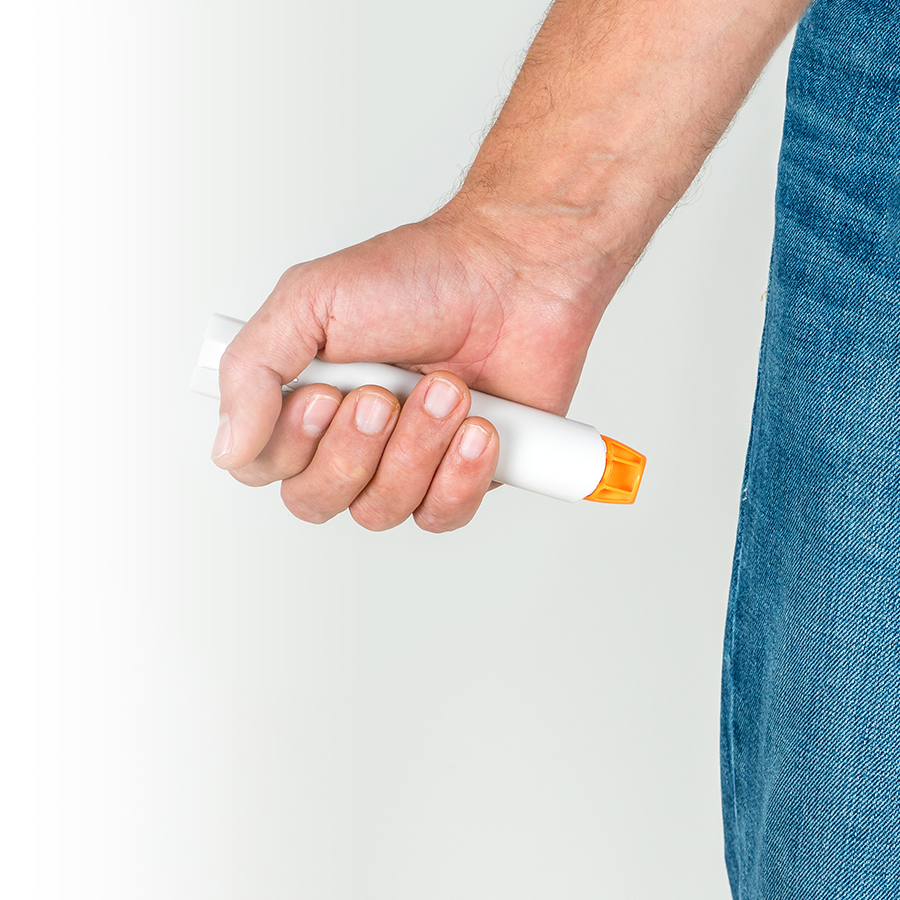What should you do if someone around you suddenly develops severe allergic symptoms? Overview of the causes and the right actions to take.
What is meant by "severe allergy"?
Severe allergies are exaggerated reactions by the body to a trigger or “allergen” that is considered dangerous by the immune system. Ironically, by trying to protect the body against this “threat”, the immune system can set into motion an overreaction, which can lead to anaphylaxis.
Anaphylaxis is a generalized severe allergic reaction that affects several systems in the body, evolves quickly and can lead to death. It necessitates an immediate medical intervention.
What are the signs and symptoms of anaphylaxis?
After exposure to an allergen, a severely allergic person could show signs of the following symptoms:
- widespread redness and itching of the skin
- swelling (especially of the throat, lips and tongue)
- difficulty speaking or breathing
- a metallic taste or itching in the mouth
- a sudden drop in blood pressure
- sudden paleness or sensation of weakness
- dizziness or altered state of consciousness or even fainting
If death occurs, it is usually caused by airway obstruction (choking) or due to blood circulation failure.
What are the most common allergens?
A number of substances or elements can cause allergies, but severe allergies are most often attributed to the following:
- food (peanuts, nuts, milk, soya, eggs, sesame, fish, etc.)
- substances or ingredients (sulfites, gluten, lactose, food colouring, etc.)
- drugs (penicillin, aspirin, morphine, codeine, etc.)
- insect stings or bites
- latex
How can an allergic reaction be avoided?
There is no medication or medical treatment that can “cure” an allergy. In nearly every case, a person with an allergy will remain allergic all of their lives. The only way to avoid an allergic reaction is to eliminate all exposure to the allergen involved. Everything possible must be done to reach this objective.
It is sometimes difficult to completely eliminate the presence of allergens in our environment, as is the case for people with a bee sting allergy, for example. However, in many other cases, such as a medication or food allergy, it is possible to maintain better control.
What are the treatment methods of anaphylaxis?
In the case of a severe allergic reaction, including anaphylaxis, swift action is necessary.
An epinephrine (adrenaline) injection is a front-line treatment.
Epinephrine is available commercially in the form of an auto-injector for easy administration by the individual themselves or by someone coming to their assistance. The auto-injector is a syringe containing a dose of epinephrine, a substance that neutralizes an anaphylactic reaction. It must be used in all cases, as it is impossible to predict the evolution of the allergic reaction. Allergic reactions are unpredictable from one episode to the next.
As soon as the first signs of an allergic reaction appear, or if contact with an allergen is suspected, epinephrine must be injected immediately. The person must then go as quickly as possible to a health centre that provides emergency medical care.
Once there, medical personnel may administer other treatments to counter the effects of the allergic reaction such as, additional doses of epinephrine, antihistamines, corticosteroids, bronchodilators, etc. All of these treatments are complementary and cannot replace the benefits of the early injection of epinephrine.
General advice concerning a severe allergy
If you have a severe allergy or you are at risk of an anaphylactic reaction, here is some additional advice:
- Tell the people around you (family, teachers, colleagues, etc.) about your allergy, including health professionals.
- Wear a bracelet or necklace such as MedicAlert, or use any other type of medical identification system that clearly identifies your allergy.
- Always keep auto-injectors of epinephrine at hand, and be ready to use them in the event of an allergic reaction.
- Carefully read the manufacturer’s instructions, ask a health professional to show you how to use it, or go on the manufacturer’s website for a thorough demonstration.
- Make sure that family members and friends know how to use the auto-injector.
- Be sure to have more than one auto-injector and keep them in strategic places (home, cottage, school bag, purse, etc.).
- Check the expiry date regularly. Your pharmacist can help you by reminding you when to replace your auto-injector. Ask your Jean Coutu affiliated pharmacist about this service.
Don’t hesitate to speak to your pharmacist if you have questions about severe allergies or anaphylaxis.

